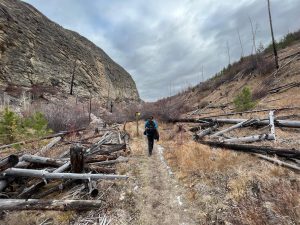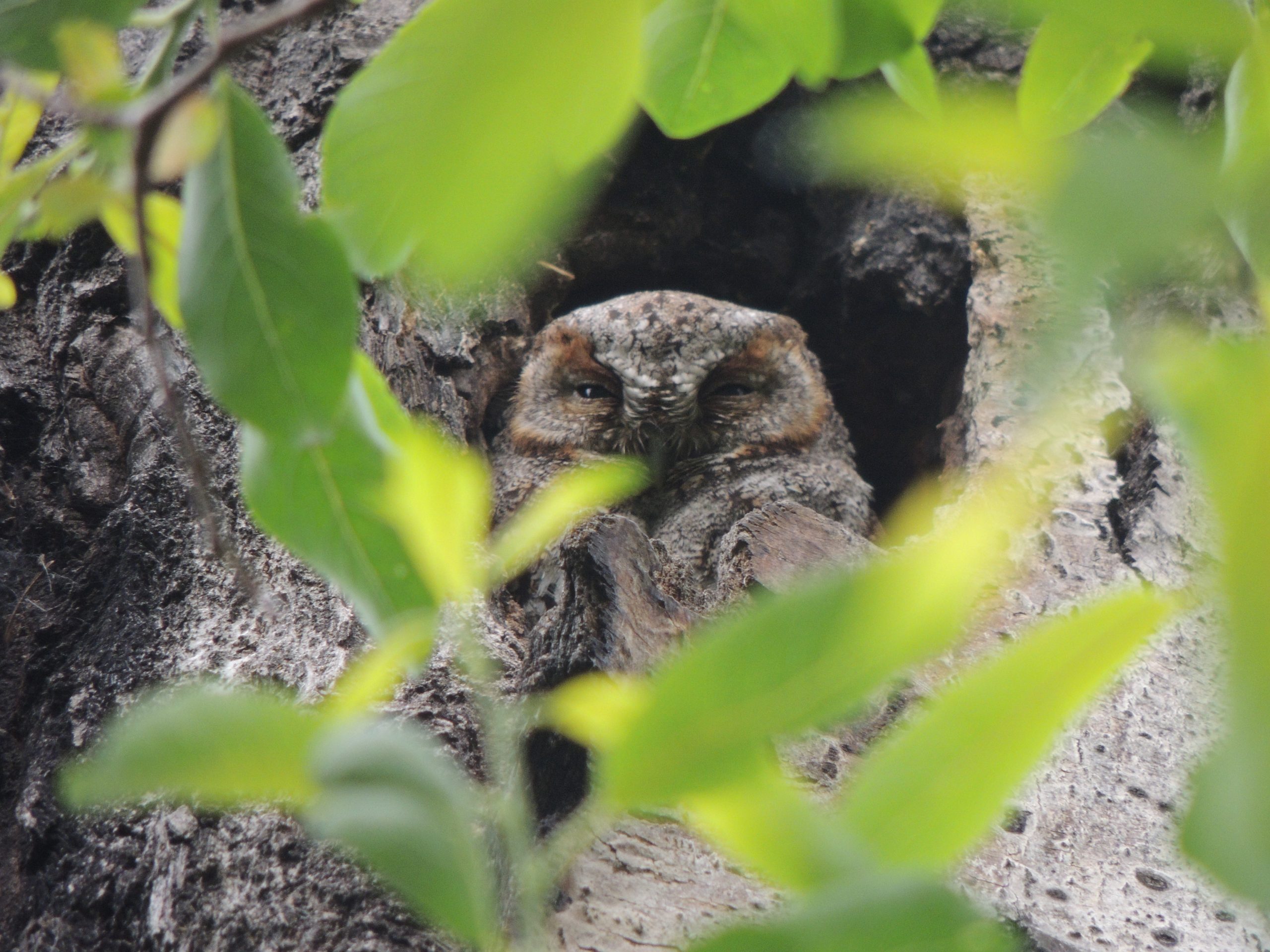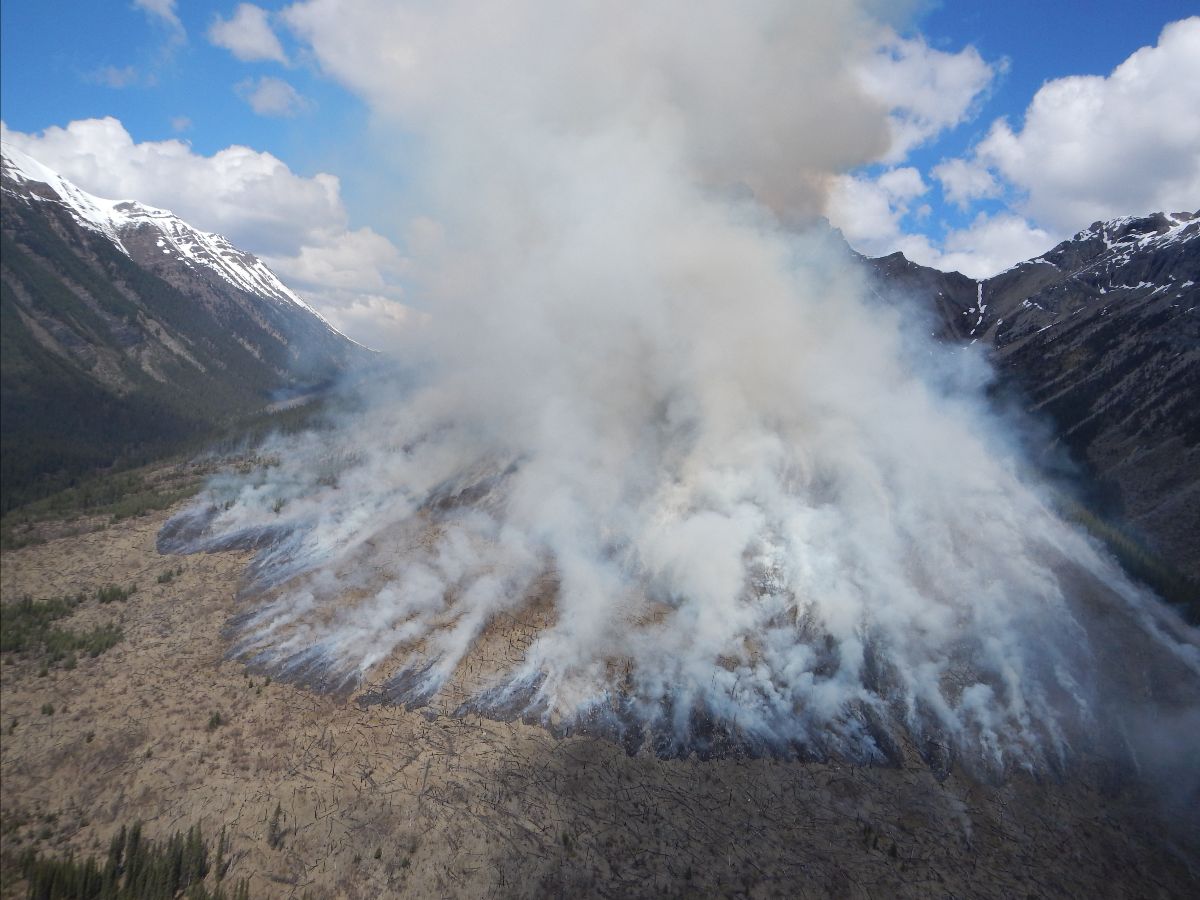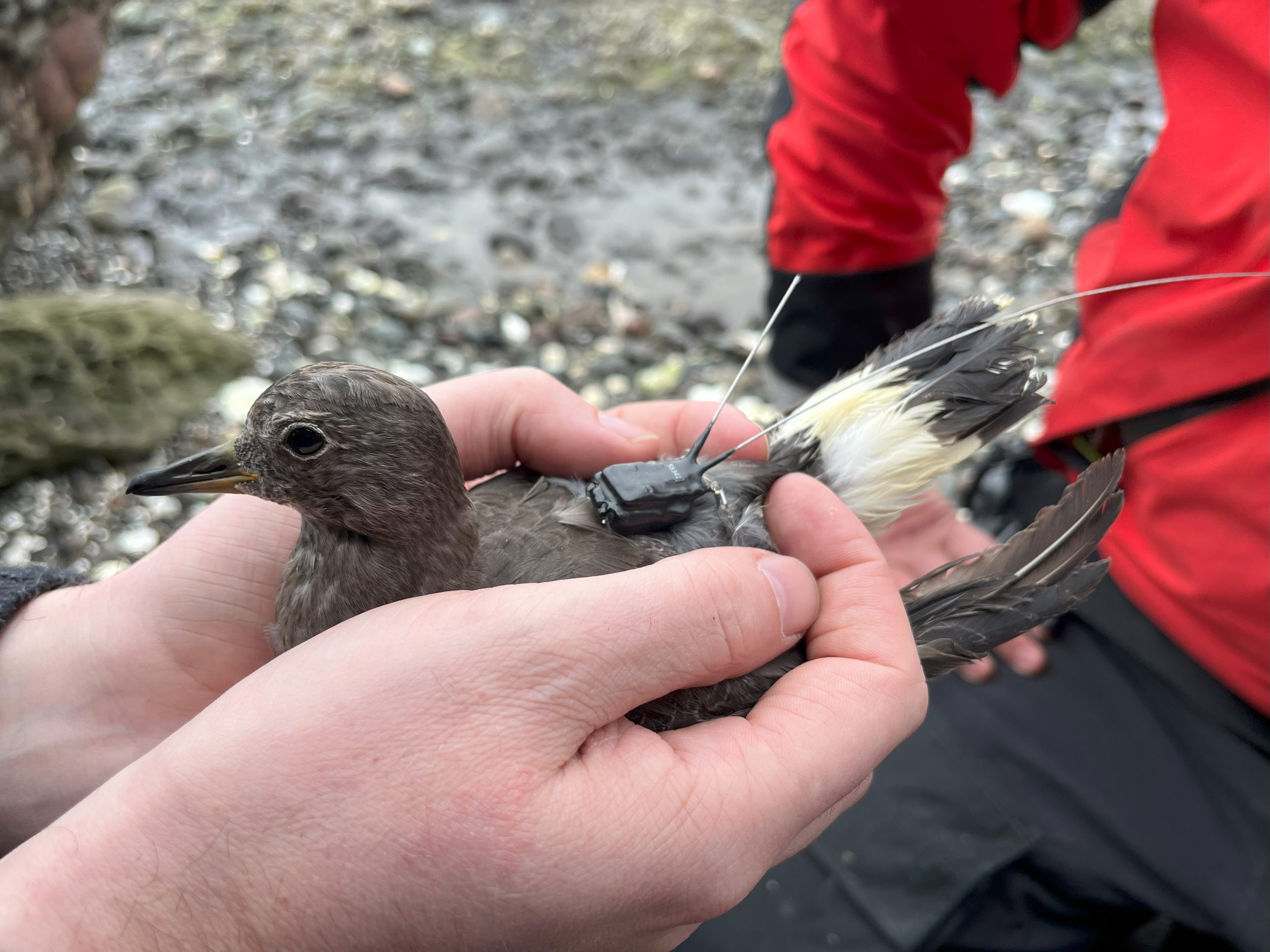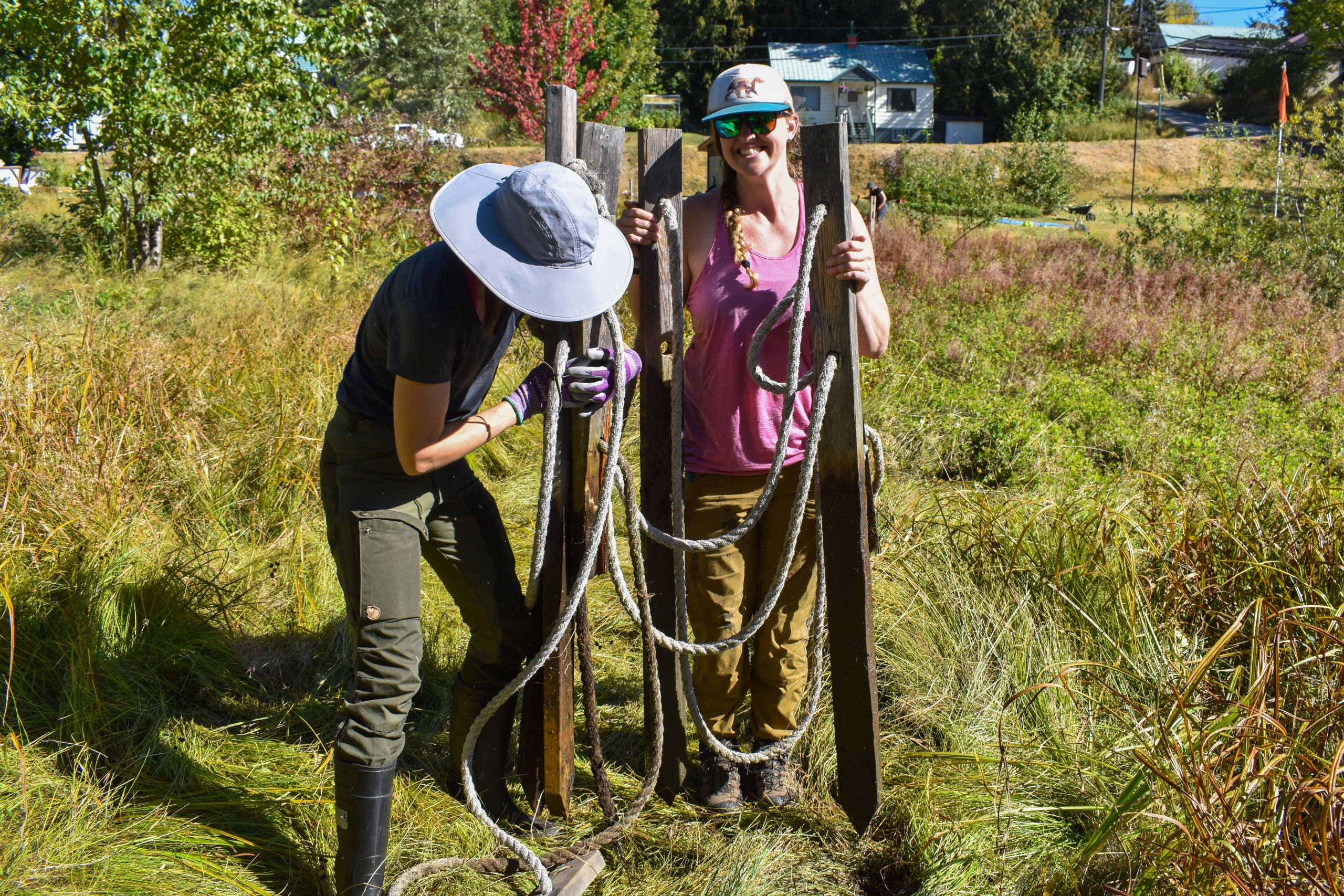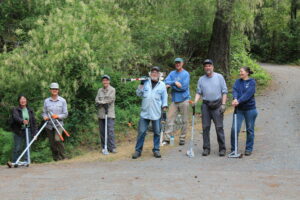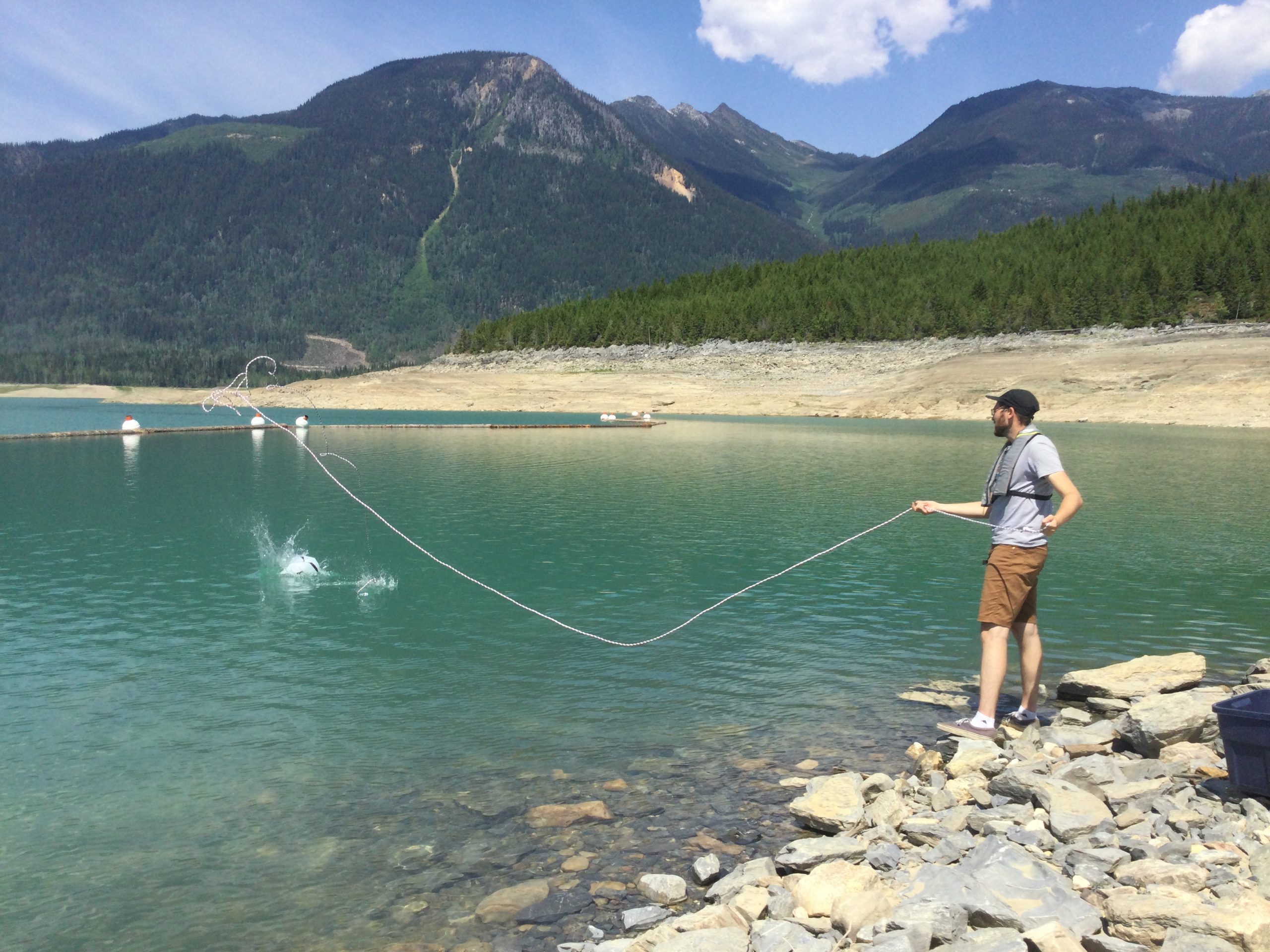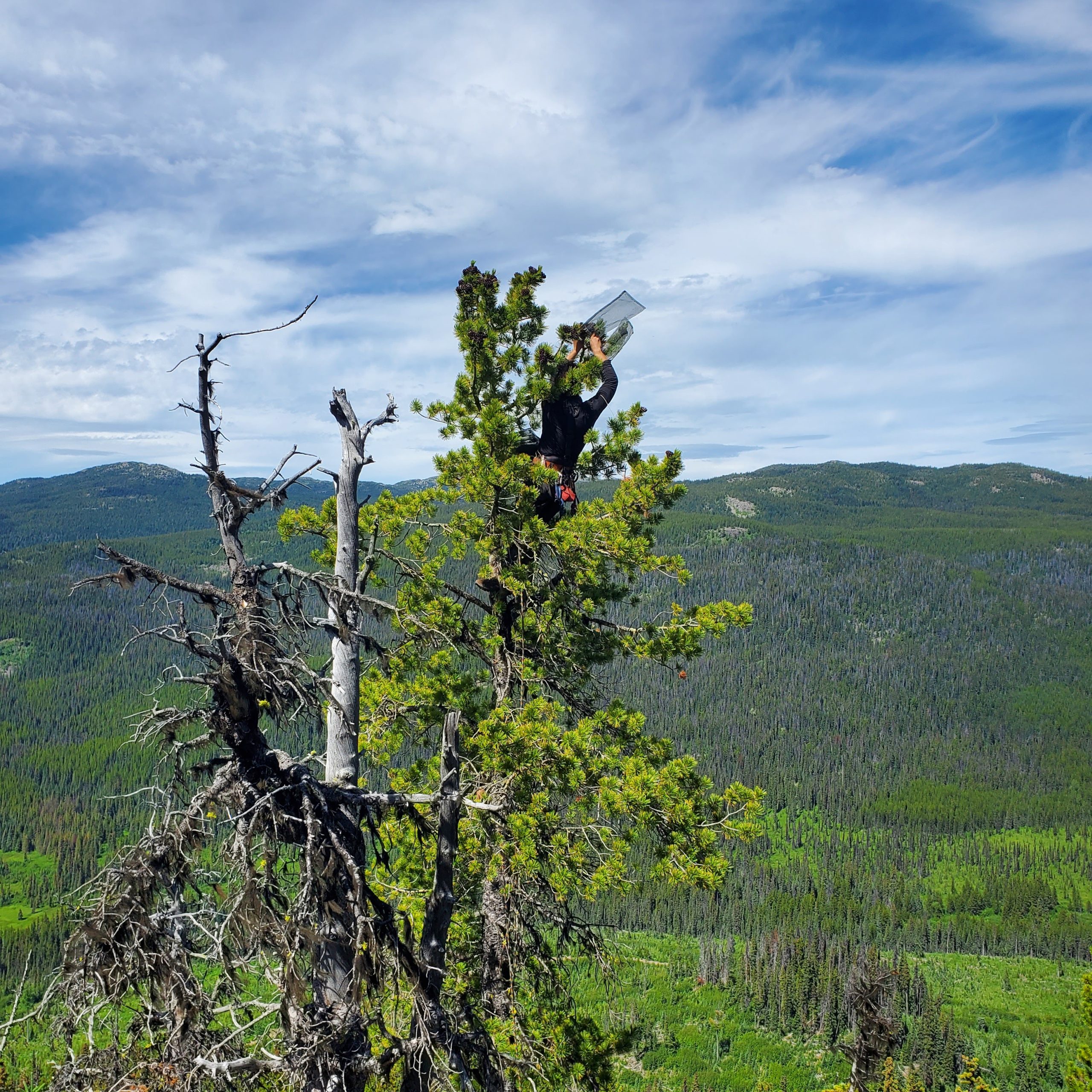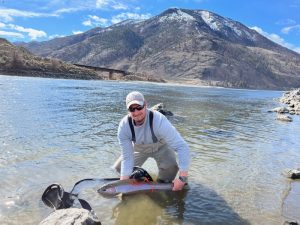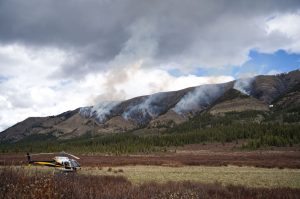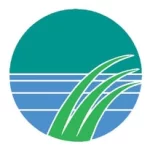In the remote, rugged, Northeastern terrain of B.C., nearly half of the world’s Stone’s sheep habitat can be found. These sheep and the ecosystem surrounding them have been supported through careful forest management practices since the 1970s. One such practice, jointly funded in recent years by HCTF and the Forest Enhancement Society of BC (FESBC), is prescribed fire.
In May 2022, approximately 160 hectares of Stone’s sheep winter habitat were treated with prescribed fire. This initiative targeted four specific slopes (hillsides), utilizing aerial ignition techniques (dropping fire from helicopters) to reduce woody vegetation, enhance forage quality, and improve predator detection capabilities for the sheep. This treatment was part of a broader objective to restore and maintain habitat not only for Stone’s sheep but, in future project years, also for bighorn sheep, which inhabit the southernmost extent of the region.
“Prescribed fire is a long-standing management practice to restore important foraging habitats for wild sheep and many other species such as moose, elk and mule deer. HCTF is proud to co-fund this work with FESBC so that our project leader can complete this critical work to benefit Stone’s sheep in the Peace Region,” remarks Dan Buffett, CEO of HCTF. “It’s a great project involving a wide variety of partners generating benefits well beyond wildlife to improve the broader forest ecosystem and create a better patchwork of grasslands and different aged forest stands over the landscape.” Viewed from above, the patches appear to be irregular in size, shape, and distribution. This is what natural landscapes often look like when fire is allowed.
In May 2024, before the summer season of wildfires experienced throughout the province, Ridgeline Wildlife Enhancement Inc., on behalf of the Wild Sheep Society of BC, worked on the project to undertake two prescribed burns. They successfully enhanced over 600 hectares or 1,400 acres of Stone’s sheep habitat using prescribed burning treatments. The resulting post-burn habitat will improve forage (food for sheep) quality and reduce dense shrub cover (so the sheep can see predators from a distance).
“The funds provided by HCTF and FESBC result in a direct, on-the-ground, immediate benefit to Stone’s sheep and their habitat,” explained Alicia Woods, a wildlife biologist with Ridgeline Wildlife Enhancement. “Within 10 days post-burn, new vegetation was visible on-site, and by eight weeks post-burn, the site was beginning to revegetate with new forage. We often see sheep move into a burned area within a few weeks to graze on the new growth. Funding for prescribed burning projects also contributes to landscape-level ecosystem restoration, reducing fuel loads, and includes benefits to other species that rely on sub-alpine grasslands.”

During and 6 weeks after a burn, seeing the return of the forage – Ridgeline Wildlife Enhancement
While the primary objective focused on strategically removing of brush and old vegetation to promote the growth of new, nutrient-rich vegetation, Woods emphasized the prescribed burns’ dual benefits, both for habitat management and as a proactive measure against uncontrolled wildfires. “By reducing the fuel load through controlled burns, we not only helped improve habitat quality but also helped mitigate the risk of severe wildfires,” she said.
An interesting objective of this project is that Woods’ team also focuses on studying and researching the impact of prescribed burns on sheep health and their habitat.
“In addition to the on-the-ground habitat benefits, funding contributed by HCTF and FESBC support a research component of the project that includes an assessment of wildlife and vegetation response to prescribed burns. In partnership with the University of Northern British Columbia, PhD students will further investigate how the habitat treated with fire may affect Stone’s sheep health. In a region that supports 50 per cent of the global population of Stone’s sheep, the enhancement of sheep habitat through this prescribed burn program has substantial benefits to this iconic species,” said Woods.
A novel aspect of the project focuses on the indirect assessment of sheep health by analyzing pellet samples for stress hormones and nutritional status indicators. This method offers a non-invasive way to gauge the potential health benefits of the burns to the sheep.
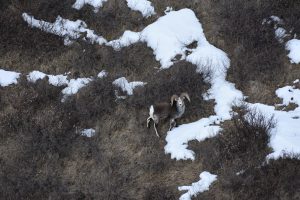
A Stone sheep returning to a site post-burn – Ridgeline Wildlife Enhancement
“As professional foresters making forest management decisions, we are often asked to manage multiple resources and values. The partnership between HCTF and FESBC provides funds to help research, investigate and find solutions in an ever-changing forest landscape on forest stewardship, specifically focused on wildlife and associated ecosystems and habitats,” said Tyler Field, Registered Forest Professional, operations manager with FESBC. “This year, for example, we are jointly funding several long-term projects that look at the effects of wildfire on certain wildlife species, which could help forest professionals make decisions in the future on using fire as a forest management tool in cultural and prescribed burns.”
While in the past couple of years, the project leaders have seen success, they have faced several challenges to get to this point:
- The logistics of such an extensive project, especially for reaching remote areas, are extremely difficult. For example, one helicopter trip to the more remote study areas costs roughly $6,000, and the project team needs to visit the sites for monitoring at least four times a year. That is why, apart from the HCTF and FESBC support, the project has additional support from the Wild Sheep Society of BC, Wild Sheep Foundation, North Peace Rod & Gun Club, and the University of Northern BC.
- Obtaining necessary government permits is a lengthy and complex process Woods shared, often taking years to navigate through bureaucratic layers. The project has submitted 25 burn permit applications and notably secured 14 burn permits, of which they have already treated six areas.
- Even after burn permits are secured, it isn’t as straightforward as implementing the burns. “Spring prescribed burns occur in a narrow window that happens sometime between when the slopes become snow-free and before the site greens up. Sometimes, this window can be as narrow as one week,” explained Woods. The narrow window for suitable burning conditions requires precise timing and flexibility, and the unpredictable weather patterns of recent years and increasing dry periods due to climate change have complicated scheduling and increased the risk of unintended fire escapes from the target burn area.
- For Woods, it is important for the public to be aware of the differences between wildfires and prescribed burns and learn why these burns are essential for maintaining ecological balance. “Prescribed burns are done in a very controlled fashion. There are very specific targets with very specific objectives. How we do it, and the conditions we do it under, are also carefully chosen,” said Woods. “The devastation of wildfires we see on the news is not how a prescribed burn site looks; after a prescribed burn the site flourishes with new vegetation.”
Woods also wants people to understand that controlled burns have always been an integral part of Indigenous practices and culture.
“The support and involvement of local First Nations, such as Fort Nelson First Nation, Halfway River First Nation, Doig River First Nation, and communities in the Kaska and Kwadacha traditional areas is not just beneficial but essential. They bring a perspective that enriches our understanding and approach,” said Woods, adding, “What they tell us about burning is also what we see, which is exciting because it confirms what I see on the ground. We conduct the burns similarly to how the First Nations used to do it – during the spring when the frost is still in the ground, so the burn doesn’t harm the soils – as a tool of controlled burning for the benefit of enhancing wildlife habitat and improving the ecological balance in the area.”
The project has become a leading example of how integrating Indigenous ecological knowledge with contemporary scientific practices can lead to more effective and sustainable forest management. Next, the project plans to expand the treated areas, aiming to cover between 500 to 1,000 hectares annually across multiple study areas.
“Our goal is to establish a cycle of burns that continuously rejuvenates the habitat,” she explained. “Ideally, we’re looking to manage these lands in a way that maintains ecosystem diversity across the landscape, which will, in turn, support the wildlife the northeast is renowned for.”
Through the dedicated efforts of Woods and her team, the prescribed burning projects in Northeastern B.C. demonstrate that thoughtful, well-managed fire regimes can profoundly benefit wildlife and ecosystems.
